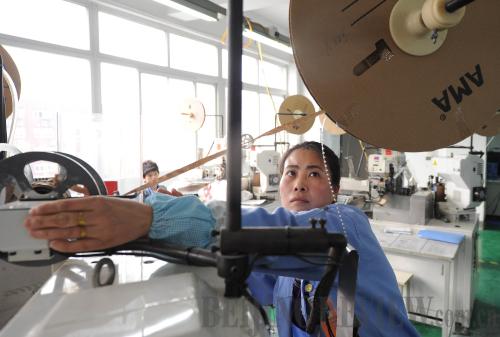|
 |
|
BACK HOME: A staff member in Chongqing Municipality works at a local firm after pursuing employment in big cities for more than 10 years. Many migrants from the area have returned to their hometowns with the improvement of salary levels and working conditions (XINHUA) |
During this year's two sessions—the National People's Congress (NPC) and the Chinese People's Political Consultative Conference (CPPCC), which only just drew to an end, offered proposals mostly concerning people's livelihoods. Following extensive media coverage, topics triggering considerable social attention including integrating migrant workers into urban areas, doubling incomes and cutting theater ticket price. The following are excerpts.
Issues on Migrant Workers
Zhai Meiqing (CPPCC member): Migrant workers are eager to settle down in cities, but generally have little education due to a lack time and funds. For this reason, they are less competitive and find only the most menial jobs. While migrants have contributed a lot to city development, the majority are still marginalized. Education and technical skills will facilitate better integration.
Vocational training should be offered to young people moving to cities for work and extended to those already employed in urban areas. It is suggested that both governments and employers pay better attention to the training of migrants.
Zhu Xueqin (NPC deputy): In a Shanghai reformatory, 85 percent of detained juveniles are the children of migrant workers. When their parents move to cities, most are left behind in minimum care and without the means of communication. Due to limited employment opportunities, these adolescents fall into disrepute when moving to urban areas themselves.
Parents, schools and society should join hands in helping these children, affording them both tolerance and the chance to restart their lives.
Zhu Liangyu (NPC deputy): The country currently employs about 4.3 million temporary security guards at companies, schools and other sites, most of whom are migrant workers. It is suggested that labor and social security administrations as well as industrial and commercial departments map out policies aimed at private security guard companies. It is hoped that in the future, China's migrant population can settle down and live a happier life, with full security in medical services, housing and pension, etc.
Plan to Double Income
Han Jianmin (NPC deputy): To ensure incomes are doubled, we need a normal wage-growth mechanism to keep pace with the country's economic development. While stabilizing commodity prices is crucial, the financial capacity of small and medium-sized enterprises should also be taken into account when offering favorable policies in terms of tax and logistics, with the view of protecting sound development.
Cai Fang (CPPCC member): To double incomes, we need to fairly distribute the development fruit of three decades of reform and opening up. If we depend on companies alone to increase workers' wages, financial sustainability might be jeopardized. The government should draw up detailed policies to support income growth and better welfare.
Zhang Yunling (CPPCC member): The policy of doubling incomes should be tailored according to different social groups. More financially favorable policies should be offered to low-income groups and remote regions.
China has vast land and a huge population. Huge gaps exist between different regions. In order to keep a basic balance, low-income groups should have their earnings tripled, middle-income groups doubled while high-income groups maintain a growth rate of 0.5 percent. In this way, the poor can benefit most from the income growth plan. The stress here lies not on "average salary growth" for each individual, but the improvement of distribution and the narrowing of the income gap.
| 